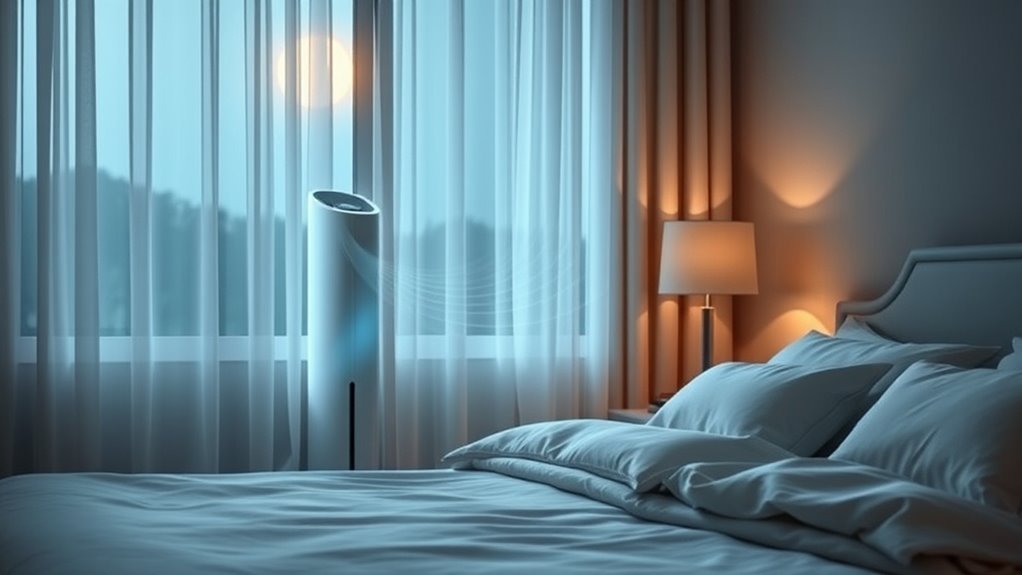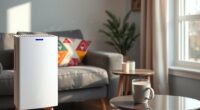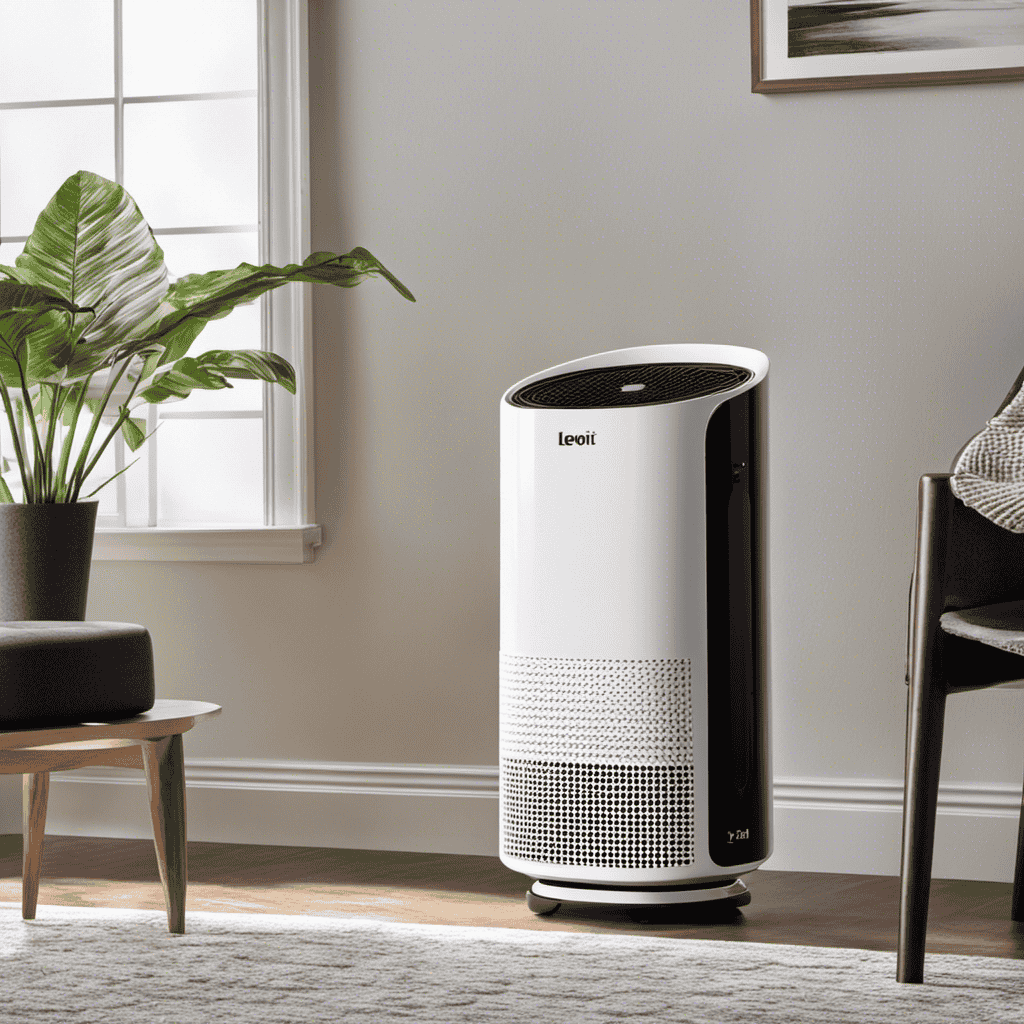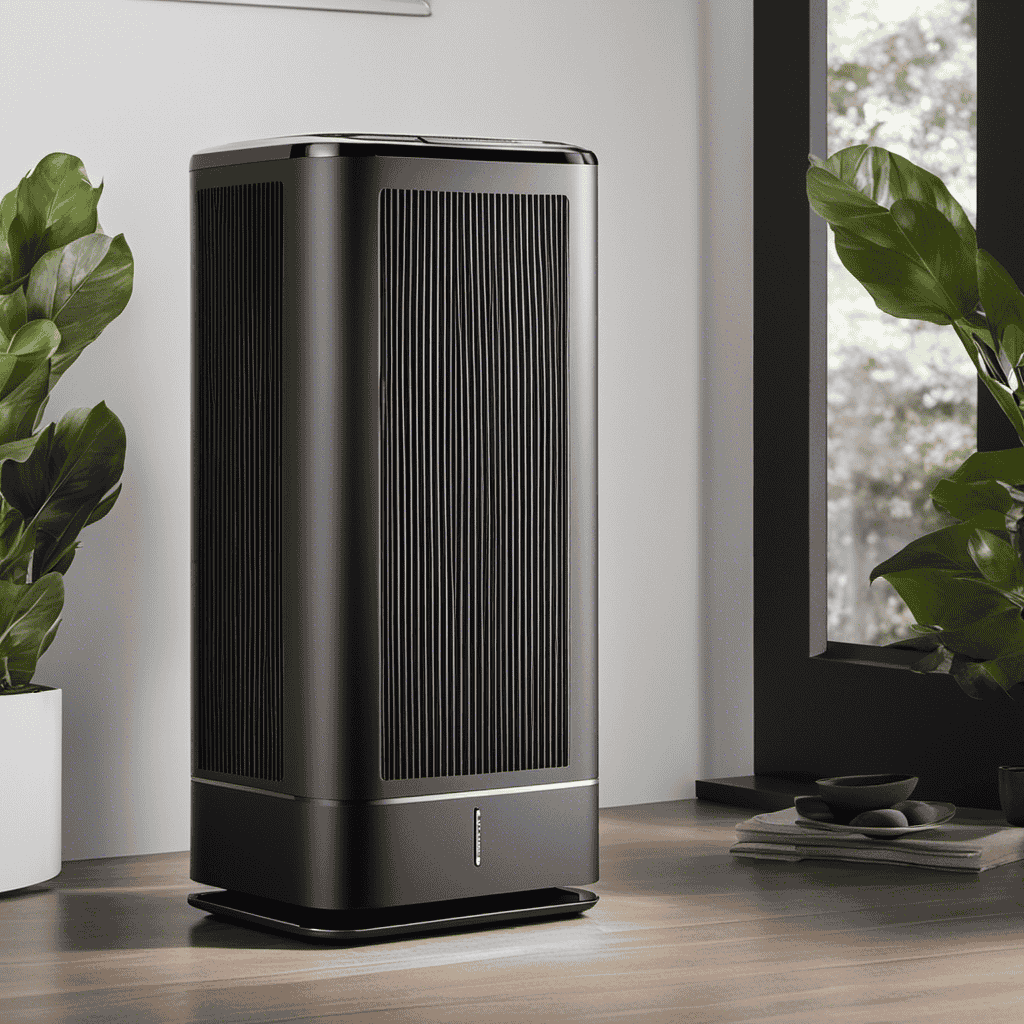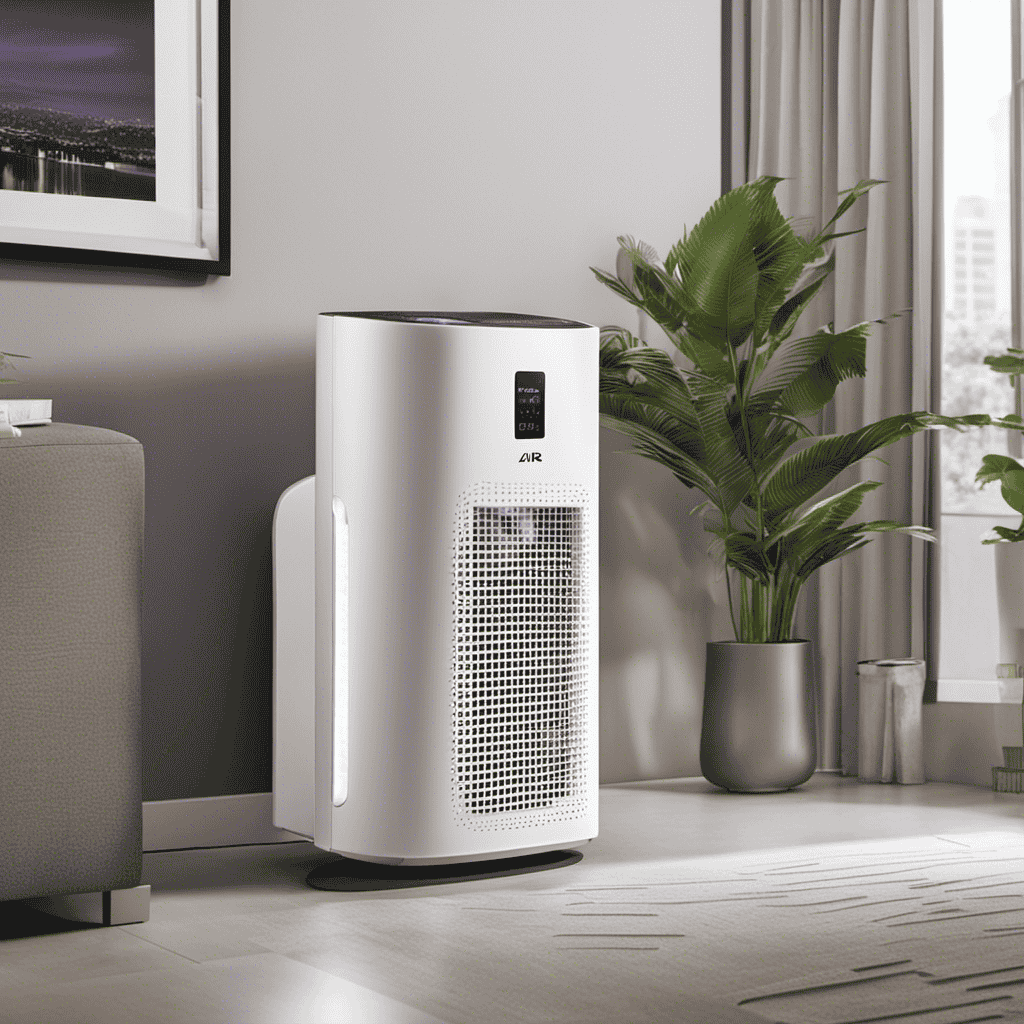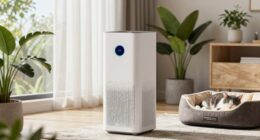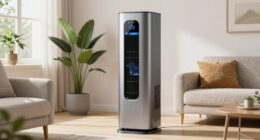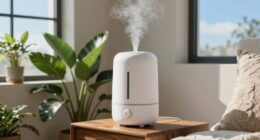Air purifiers can help you sleep better by reducing airborne allergens like dust, pet dander, and pollen, which cause congestion and irritation. They also remove irritants that may contribute to snoring by clearing your air of dust and mold spores. Using a suitable purifier consistently, with proper maintenance and placement, can improve air quality and may lessen allergy symptoms and snoring. To discover how to optimize these benefits, keep exploring more effective strategies.
Key Takeaways
- Air purifiers with HEPA filters can reduce airborne allergens like dust, pollen, and pet dander, improving sleep quality.
- Removing dust and allergens may lessen nasal congestion, potentially decreasing snoring caused by airway obstruction.
- Proper maintenance and placement of air purifiers ensure optimal airflow, supporting healthier, quieter sleep environments.
- Using air quality sensors helps monitor irritants, allowing proactive adjustments to enhance sleep comfort.
- Combining air purification with other allergy and snoring mitigation strategies leads to more restful, uninterrupted sleep.
How Do Air Purifiers Work to Improve Indoor Air Quality
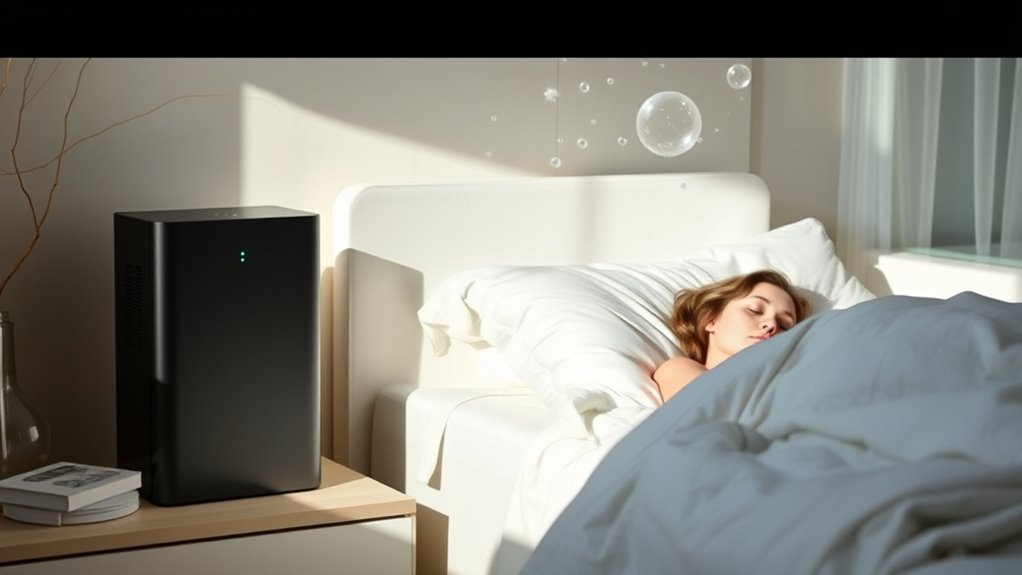
Air purifiers work by actively removing harmful particles and pollutants from the air you breathe indoors. Their mechanisms typically include filters like HEPA, activated carbon, or UV lights that target specific contaminants. HEPA filters trap dust, pollen, pet dander, and mold spores, markedly improving indoor air quality. Activated carbon filters absorb odors, chemicals, and volatile organic compounds (VOCs). Some purifiers also use UV light to eliminate bacteria and viruses. As air passes through these components, pollutants are captured or neutralized, reducing airborne irritants. Additionally, advancements in automation in business enable the development of smarter air purification systems that adapt to changing indoor conditions. These systems often incorporate smart features such as sensors and automatic adjustments to optimize filtration. By continuously cycling indoor air through these mechanisms, you create a cleaner environment. This enhanced indoor air quality can help reduce allergy symptoms, improve breathing, and contribute to better sleep overall. Furthermore, the integration of advanced filtration technology helps target even smaller particles, ensuring a more comprehensive purification process. The use of air quality sensors in modern units allows for real-time monitoring and adjustments to maintain optimal air conditions. Incorporating user-friendly maintenance features in modern units also simplifies filter replacement and cleaning, maintaining optimal performance over time.
The Connection Between Allergens and Sleep Disruption
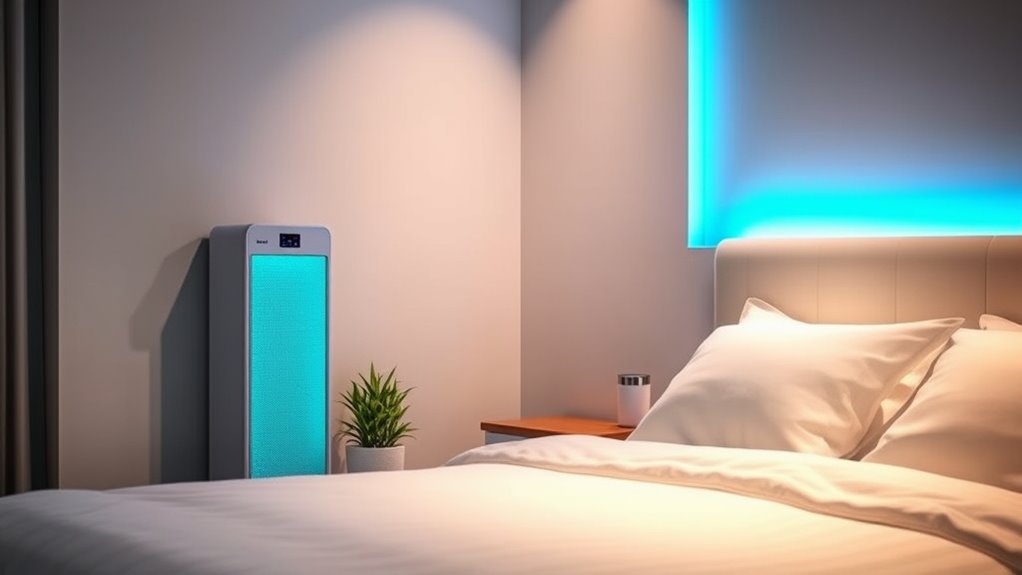
If allergens like dust, pet dander, or mold are in your bedroom, they can cause allergy symptoms that disturb your sleep. These pollutants trigger congestion, sneezing, and irritation, making it hard to fall or stay asleep. Addressing these allergens can help you achieve more restful, uninterrupted nights. Incorporating a vacuum with HEPA filters can further reduce airborne allergens and improve sleep quality. Additionally, using air purifiers designed to target common allergens enhances the overall effectiveness of your allergy management. Regular use of air purifiers can also help in reducing harmful pollutants like smoke and VOCs, creating a cleaner sleeping environment. Implementing air quality monitoring can help you detect and address allergen levels proactively, ensuring a healthier sleeping environment. Understanding the regulatory standards for air purifiers can also ensure you select products that are both safe and effective.
Pollutants Trigger Disruptions
Pollutants such as allergens can notably disrupt your sleep by triggering immune responses that interfere with rest. These tiny particles can linger indoors, especially when air quality isn’t monitored closely. Indoor plants can help improve air quality naturally, but they also release allergens that might worsen disruptions for sensitive sleepers. To keep pollutants in check, using air quality sensors is essential—they detect airborne irritants and let you take action before sleep. Cleaner air reduces inflammation and immune activity that can interfere with your rest cycle. Keeping pollutants low creates a healthier sleep environment, helping you fall asleep faster and enjoy more restorative sleep. Combining indoor plants with air quality sensors offers a proactive approach to minimizing disruptions caused by indoor pollutants.
Allergy Symptoms and Sleep
Allergy symptoms can substantially disrupt your sleep by causing discomfort and waking you multiple times during the night. Dust mites and pet dander are common triggers that worsen allergies and make restful sleep difficult. When these allergens are present in your environment, you may experience sneezing, nasal congestion, or itchy eyes, all of which interrupt your rest. To minimize these issues, consider:
- Using air purifiers to reduce airborne dust mites and pet dander
- Keeping pets out of the bedroom
- Washing bedding regularly in hot water
- Using hypoallergenic mattress and pillow covers
Scientific Evidence Supporting Air Purifiers for Allergy Relief
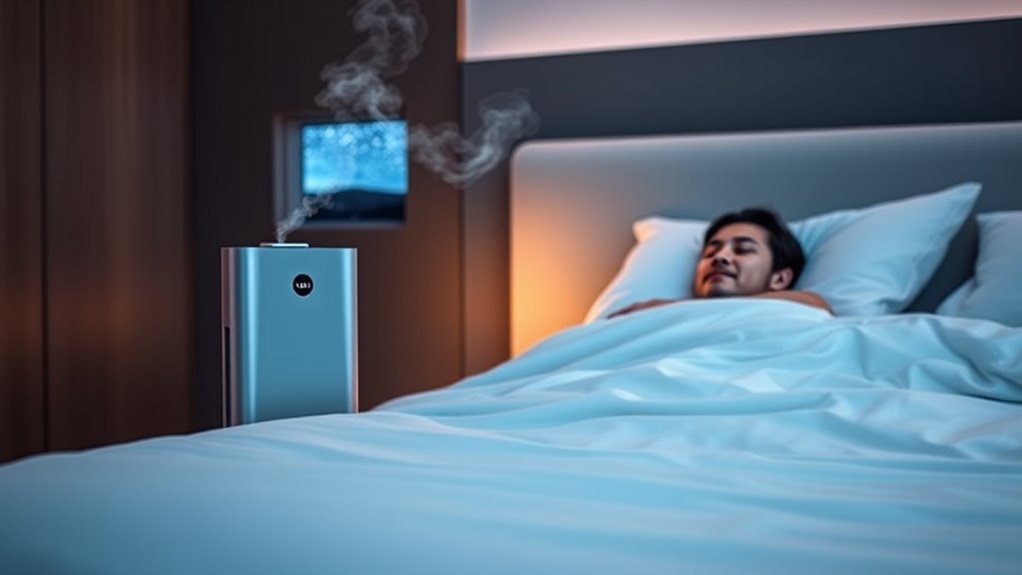
Scientific studies show that air purifiers can effectively reduce airborne allergens and pollutants in your home. Their filtration efficiency plays a vital role in capturing particles like dust, pollen, and pet dander. Research consistently demonstrates that using air purifiers leads to noticeable improvements in allergy symptoms and sleep quality. Additionally, unique and wicked planters can add a decorative touch to your space, making the environment more inviting and potentially reducing stress that can interfere with sleep. Incorporating HEPA filtration technology can further enhance their ability to improve air quality, contributing to better overall health. In fact, integrating home security systems into your environment can contribute to a greater sense of safety, which is also linked to better sleep. Moreover, understanding the legacy of great explorers reminds us of the importance of resilience and perseverance, qualities that can inspire us to improve our health and well-being through better sleep habits.
Pollutant Filtration Efficiency
Have you ever wondered how effectively air purifiers can remove harmful particles from your indoor environment? Scientific studies show that high-quality units can capture over 99% of airborne pollutants like dust, pet dander, and pollen. Their pollutant filtration efficiency depends on factors like filter type and maintenance. To keep your air purifier working perfectly, regular air purifier maintenance is essential, especially filter replacement. Additionally, selecting a device with proven filtration efficiency can significantly improve indoor air quality. Incorporating testing procedures can help verify the purifier’s performance and ensure optimal operation.
Research indicates that using HEPA filters, which trap tiny particles as small as 0.3 microns, is crucial for effective allergen removal. Proper filter replacement ensures consistent performance, preventing the buildup of trapped particles that can reduce efficiency. Activated carbon filters also play a vital role in removing odors and VOCs, further enhancing air quality. Regular cleaning of pre-filters can prevent bypass and maintain efficiency, ensuring your air purifier functions optimally. Incorporating a purifier with advanced filtration technology can provide a noticeable difference in your indoor environment, promoting cleaner, healthier air for better sleep. Additionally, leveraging performance upgrades such as high-efficiency filters can optimize your air purifier’s effectiveness over time.
By understanding air quality monitoring, you can better assess the effectiveness of your purification system and make necessary adjustments to improve results.
Allergen Reduction Evidence
Ever wondered if air purifiers can truly ease allergy symptoms? Scientific studies show they can markedly reduce allergens like pollen, pet dander, and dust mites. Proper air purifier maintenance is key to keep filters effective and prevent allergic reaction triggers from circulating. Regularly replacing filters ensures maximum allergen capture and minimizes airborne irritants. Additionally, choosing models with HEPA filters can enhance allergen removal efficiency. Incorporating crochet techniques for fabric covers or filters can also help in trapping smaller particles and improving air quality. Using air quality monitors can help track improvements and ensure the purifier maintains optimal performance. Implementing filter replacement schedules is essential to sustain their effectiveness over time. Employing cybersecurity practices when managing smart air purifiers can help prevent unauthorized access and ensure device safety.
Scientific Study Results
Numerous studies confirm that air purifiers considerably reduce allergen levels in indoor environments, providing real relief for allergy sufferers. Research shows that using a high-quality purifier can markedly lower dust, pollen, and pet dander, improving air quality and sleep quality. When choosing an air purifier, consider factors like *air purifier maintenance*—regular filter changes are essential for effectiveness—and *noise levels*, which can impact your sleep comfort. Scientific experiments also highlight that consistent use leads to sustained allergen reduction. Additionally, studies suggest that combining air purifiers with proper maintenance routines enhances overall benefits. For instance, quieter models allow peaceful sleep without disturbance, while well-maintained units ensure peak performance. These findings underscore the importance of selecting a suitable device for long-term allergy relief. Proper understanding of Rhythm Failure can also inform better choices for ambient music and environment optimization during sleep. Moreover, understanding filter efficiency helps in choosing the most effective device for allergen removal. Regularly updating your knowledge about air quality standards can further improve your sleep environment. Furthermore, selecting an air purifier with appropriate coverage area ensures optimal air purification for your space.
Can Air Purifiers Help Reduce Snoring? Exploring the Link
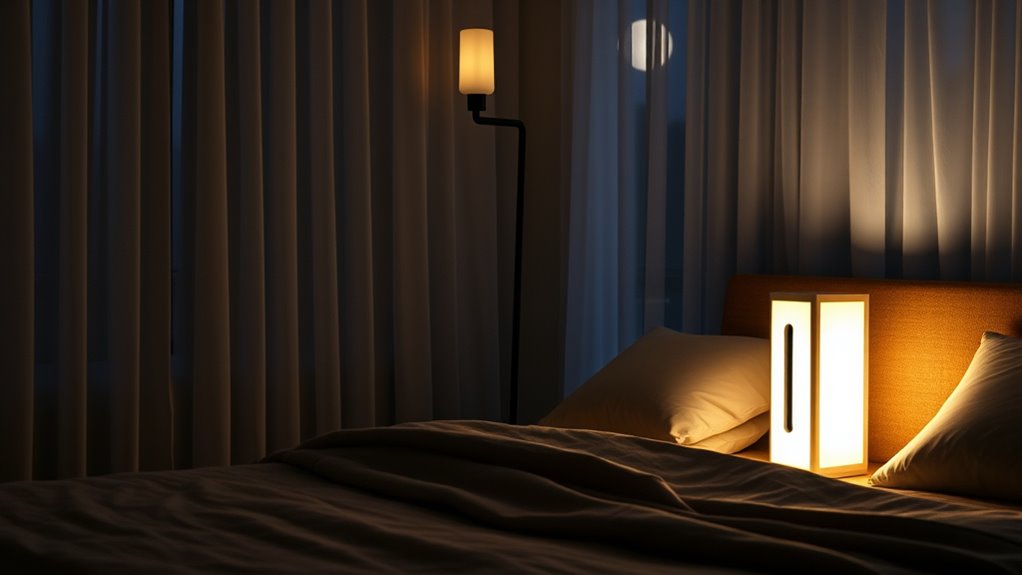
While air purifiers are commonly used to improve indoor air quality, their potential to reduce snoring is less well-known. Snoring often results from blocked airflow caused by allergens, dust, or pollutants in the bedroom. An air purifier can help by removing airborne irritants that contribute to nasal congestion, making breathing easier at night. Proper air purifier maintenance is vital to guarantee it functions efficiently, maintaining ideal bedroom airflow. When your purifier runs smoothly, it reduces the buildup of allergens and dust that can cause or worsen snoring. While it’s not a guaranteed cure, keeping the air clean may decrease airway obstruction, promoting quieter, more restful sleep. Remember, consistent maintenance and strategic placement are key to maximizing these benefits.
Choosing the Right Air Purifier for Allergies and Snoring
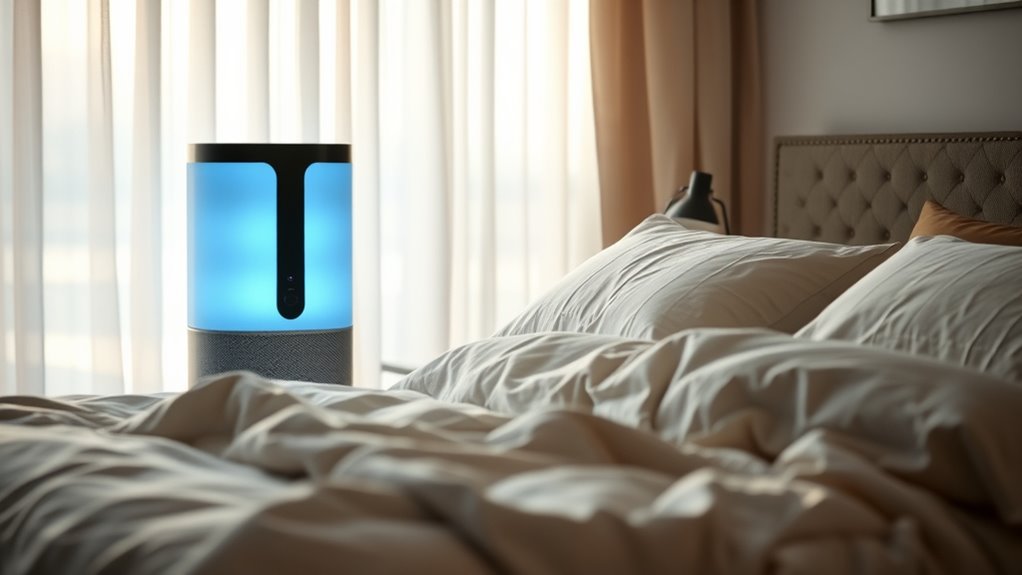
Choosing the right air purifier for allergies and snoring involves understanding your specific needs and selecting a model that effectively targets airborne irritants. Consider the size of your room to guarantee proper coverage. Look for units with HEPA filters, which capture pollen, dust, and pet dander. Pay attention to air purifier maintenance—regular filter changes are essential for peak performance. Noise level considerations matter too; choose quieter models to avoid disrupting sleep. Additionally, check for features like adjustable fan speeds and timers to customize operation. A well-chosen air purifier reduces allergens and airborne pollutants, improving sleep quality and potentially decreasing snoring caused by congestion. Selecting the right device means balancing filtration efficiency, ease of maintenance, and noise levels for a more restful night.
Practical Tips for Maximizing the Benefits of Air Purifiers During Sleep
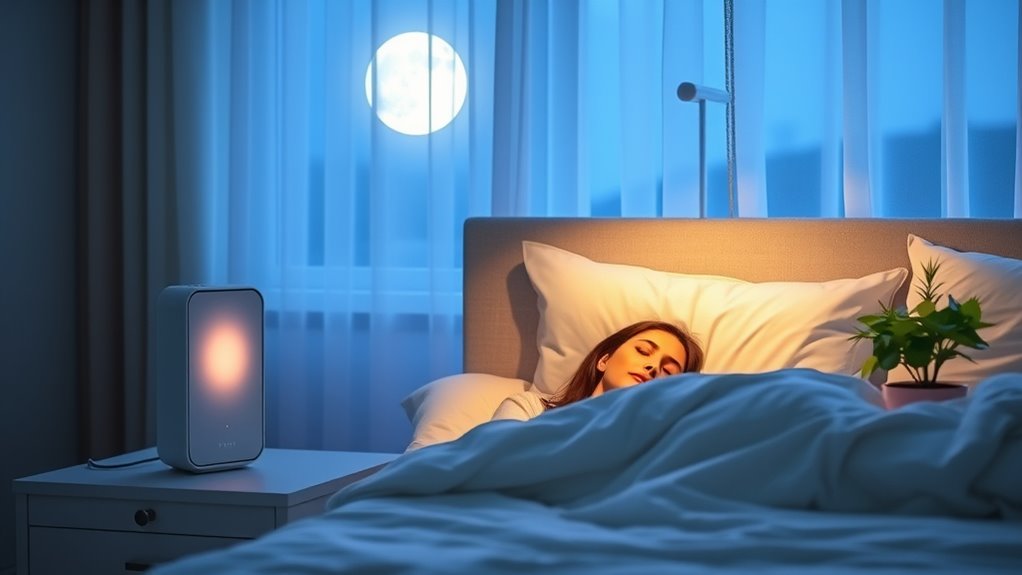
To get the most out of your air purifier during sleep, position it correctly in your room to guarantee ideal airflow and coverage. Place it near your bed but avoid blocking vents or airflow paths. Use air quality monitoring devices to track improvements and identify pollution sources. Regularly changing or cleaning filters ensures top-notch performance. Incorporate your air purifier into your sleep hygiene routines by turning it on before bed and keeping it running throughout the night. Keep your room tidy and minimize clutter to prevent dust buildup. Maintain a consistent sleep schedule and ventilate your space during the day to improve overall air quality. These practices help maximize the benefits of your air purifier, leading to cleaner air and more restful sleep.
Limitations and Considerations When Using Air Purifiers at Night
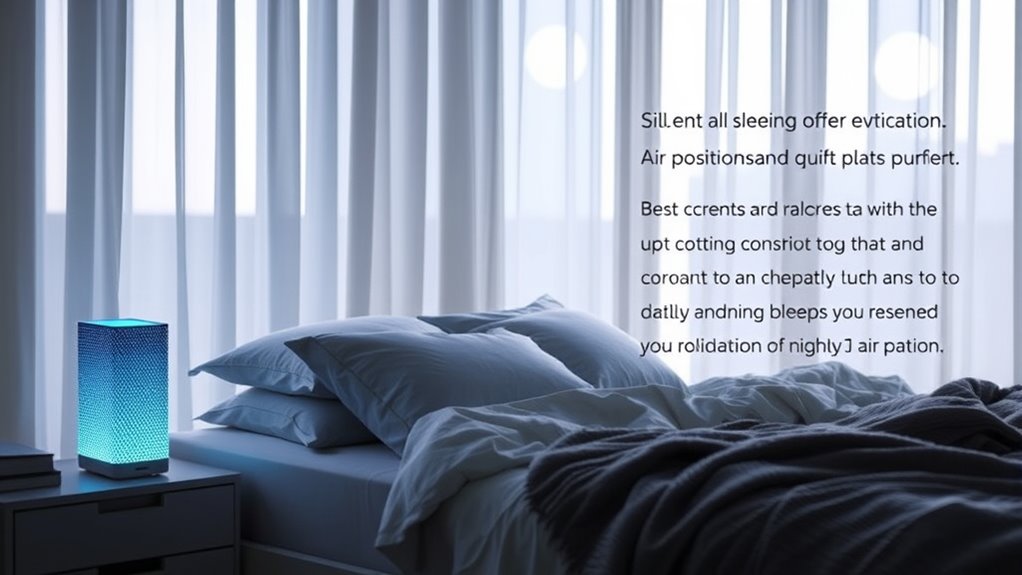
Although air purifiers can improve sleep quality, they have limitations you should consider. One major factor is cost considerations, as high-quality units with advanced filters can be expensive to purchase and maintain. Additionally, noise level matters; some purifiers operate loudly, disrupting your sleep if not chosen carefully. Keep in mind that air purifiers are not a cure-all—they may not remove all allergens or odors instantly. Placement is important too; improper positioning can reduce effectiveness. Lastly, ongoing filter replacements add to overall costs and maintenance efforts. Before buying, weigh these factors to ensure the device fits your needs without causing more sleep disturbances or financial strain. Being aware of these limitations helps you make an informed decision for better sleep.
Frequently Asked Questions
Do Air Purifiers Remove All Types of Allergens Effectively?
You wonder if air purifiers remove all allergens effectively. While HEPA filters target common allergens like pollen, pet dander, and dust mites, they might not eliminate every allergen. Some models also feature VOC removal, helping reduce chemical odors and irritants. However, no purifier can remove every allergen completely. To improve results, choose a device with a high CADR rating and proper filtration, and regularly maintain it for ideal performance.
How Loud Are Most Air Purifiers During Sleep Hours?
Most air purifiers operate quietly during sleep hours, with noise levels typically ranging from 20 to 50 decibels. This gentle sound usually doesn’t cause sleep disturbance, allowing you to rest peacefully. However, some models with higher fan speeds may produce more noise, so it’s best to choose a purifier with a sleep mode or low noise setting. This way, you can enjoy clean air without sacrificing your sleep quality.
Can Air Purifiers Help With Non-Allergic Respiratory Issues?
Imagine breathing in fresh mountain air, feeling your lungs fill effortlessly. Air purifiers can help with non-allergic respiratory issues by improving air quality, removing dust, pollutants, and irritants that can cause discomfort. This air quality improvement supports your respiratory health benefits, easing breathing and reducing congestion. So, if you struggle with respiratory discomfort, using an air purifier could be a simple, effective way to breathe easier daily.
Are There Specific Features to Look for in a Sleep-Friendly Air Purifier?
When choosing a sleep-friendly air purifier, look for quiet operation and low noise levels to avoid disrupting your sleep. Prioritize models with energy efficiency, so it runs smoothly without raising your energy bills. Features like adjustable fan speeds and timers help customize your experience. A compact design and easy filter replacement also make it more convenient. These features guarantee your sleep environment remains calm, clean, and comfortable throughout the night.
How Often Should Filters Be Replaced for Optimal Performance?
Like a well-oiled machine, your air purifier needs regular care. For peak performance, stick to the recommended replacement schedule—usually every 3 to 6 months for filters. Regular filter maintenance ensures your device effectively reduces allergens and pollutants. Keep an eye on indicator lights or check filters monthly, especially if you have allergies or pets. Proper filter replacement keeps your air clean and your sleep uninterrupted.
Conclusion
By choosing the right air purifier, you might find your nights suddenly clearer and more restful. It’s no coincidence that cleaner air can reduce allergies and quiet snoring, helping you wake up refreshed. When you prioritize good air quality, you’re not just improving your sleep—you’re creating a healthier environment. So, take that step tonight; sometimes, the simplest change can make all the difference in your sleep and overall well-being.
